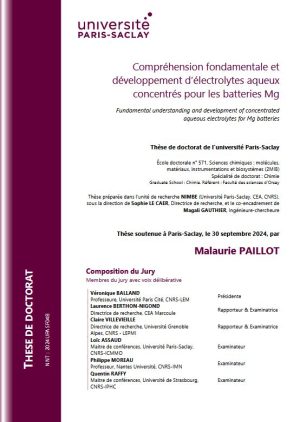Abstract:
Aqueous batteries were long believed to be constrained by the stability window of water (1.23 V), but this is no longer true thanks to water-in-salt electrolytes (WISEs). Using highly concentrated solutions leads to an extraordinary increase of the potential window of lithium aqueous batteries. It is mainly explained by the decrease of free water molecules and by the crucial role of the anion on the formation of the solid interphase electrolyte (SEI). While WISEs open the way for sustainable systems, these solutions only use expensive and toxic salts. Magnesium and associated salts are an interesting alternative: safer, less expensive and more abundant than lithium. Yet, the few Mg batteries based on WISEs reported only slightly improve the potential window to 2 V, without a clear understanding of the mechanisms at work.
The aim of the thesis is to rationalize reactivity of concentrated aqueous solutions to design strategies for increasing the potential window of aqueous Mg batteries. One key parameter revealed in the case of imide or perchlorate-based electrolytes is the amount of ions in solution, whereas the nature of the cation (Li or Mg) has little influence. In addition, radiolysis experiments were used to propose degradation mechanisms for these electrolytes. These results were also correlated with the electrochemical behaviour. Finally, we demonstrated the benefits of using a concentrated aqueous electrolyte composed essentially of magnesium perchlorate. This electrolyte exhibits good electrochemical performance.
This work shows the interest and possibility of implementing an effective strategy to limit water reactivity in aqueous magnesium batteries.
Keywords: Radiolysis, Magnesium, Batteries, Spectroscopies, Aqueous electrolytes, Electrochemistry.
Compréhension fondamentale et développement d’électrolytes aqueux concentrés pour les batteries Mg
Résumé :
Il a longtemps été admis que les batteries aqueuses étaient limitées par la fenêtre de stabilité de l’eau (1,23 V), mais ce n’est plus le cas avec les électrolytes aqueux concentrés en sel (WISEs). Ces solutions hautement concentrées permettent une forte augmentation de la fenêtre de potentiel des batteries aqueuses au lithium. Cela s’explique principalement par la forte diminution des molécules d’eau libres et par le rôle crucial joué par les anions sur la formation d’une interphase solide/électrolyte. Alors que ces WISEs ouvrent la voie à des systèmes durables, les sels utilisés sont coûteux et toxiques. Le magnésium et les sels associés constituent une alternative intéressante : plus sûr, moins cher et plus abondant que le lithium. Toutefois, les rares batteries au magnésium à base de WISEs reportées n’améliorent que légèrement la fenêtre de potentiel, avec seulement 2 V, sans une compréhension claire des mécanismes en jeu.
L’objectif de la thèse est de rationaliser la réactivité de solutions aqueuses concentrées pour concevoir des stratégies pour augmenter la fenêtre de potentiel des batteries aqueuses au magnésium. L’un des paramètres clés révélé dans la réactivité d’électrolytes à base d’imide ou de perchlorate est la quantité d’ions en solution, alors que la nature du cation (Li ou Mg) a peu d’influence. Par ailleurs, des expériences de radiolyse ont permis de proposer des mécanismes de dégradation de ces électrolytes. Ces résultats ont également été corrélés avec les comportements de ces électrolytes en cellule électrochimique. Enfin, nous avons montré l’intérêt d’utiliser un électrolyte aqueux concentré composé essentiellement de perchlorate de magnésium. Cet électrolyte présente de bonnes performances électrochimiques.
Ce travail montre l’intérêt et la possibilité de mettre en place une stratégie efficace pour limiter la réactivité de l‘eau dans les batteries aqueuses au magnésium.
Mots-clés : magnésium, électrochimie, électrolytes aqueux, spectroscopie, radiolyse, batteries.


